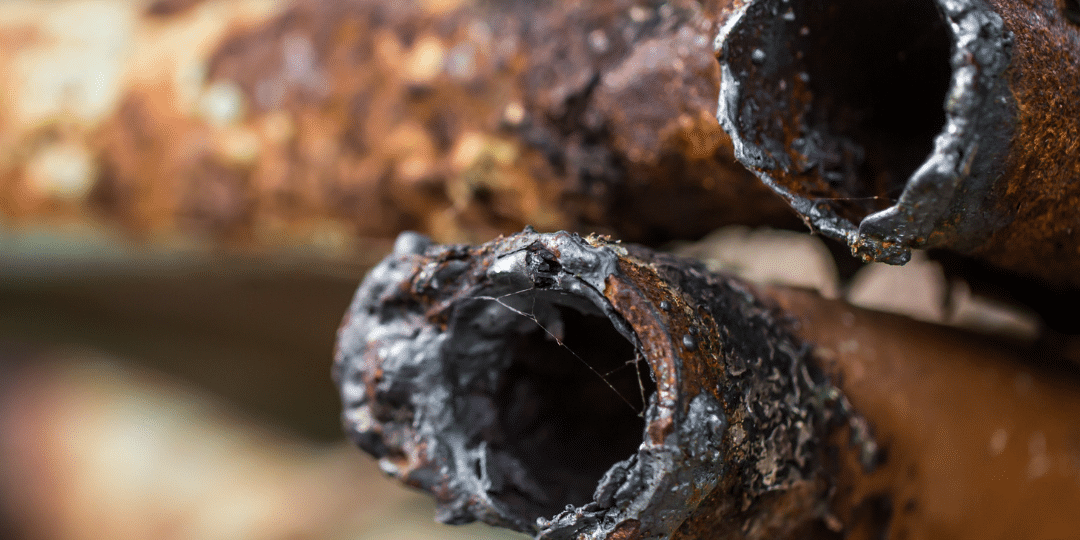Your home’s plumbing system is vital for daily tasks, from hot showers to clean drinking water. But over time, even the most durable pipes can fall victim to corrosion. Corroded pipes not only compromise water quality and pressure but also increase the risk of water damage, health hazards, and expensive repairs. Identifying early warning signs and acting fast can help you avoid structural damage, costly replacements, and plumbing emergencies.
1. Signs Your Pipes May Be Corroded
Discolored Water
If your tap water appears brown, yellow, or greenish-blue, that’s a red flag. Brown or orange hues typically come from rust in galvanized iron pipes, while green or blue tints often indicate copper pipe corrosion. This discoloration isn’t just unappealing—it could indicate harmful contaminants in your drinking water and a compromised plumbing system.
Low Water Pressure
Experiencing weak flow in your shower or sink? Corroded pipes can lead to mineral buildup and pipe narrowing, resulting in reduced water pressure. This can strain your water heater and fixtures, increasing your utility bills and making everyday tasks frustrating.
Unusual Tastes or Odors
A metallic taste or rotten egg smell in your water may signal pipe corrosion or bacterial growth within your water lines. This can affect water quality and indoor air quality, particularly if corrosion leads to leaking pipes behind your walls or in your crawl space.
Visible Rust or Flaking
Check exposed plumbing, such as under sinks or near your water heater, for reddish-brown stains, flaking, or white crusty buildup. These signs point to oxidation and galvanic corrosion on copper or cast iron pipes—clear indicators of internal pipe damage.
Frequent Leaks and Clogs
Persistent leaks, slab leaks, or clogged drains may stem from deteriorated pipes. Corroded lines are more prone to breaking or bursting, especially during temperature shifts or water pressure fluctuations. If your home experiences sudden floods, musty odors, or water stains on ceilings or floors, don’t ignore the warning signs.
2. What Causes Pipe Corrosion?
Pipe corrosion can stem from several issues, including:
- Hard water and mineral content: Calcium, iron, and other minerals can cling to the inside of pipes, causing scale buildup and increasing pH imbalance.
- Chemical drain cleaners: Harsh substances can deteriorate pipe walls over time.
- High water pressure: Constant stress on your pipes can accelerate wear and tear.
- Poor installation: Loose fittings, incompatible materials, and lack of backflow prevention can all accelerate corrosion.
- Old materials: Outdated plumbing systems, especially those using lead, galvanized steel, or polyvinyl chloride (PVC), are more likely to corrode or crack over time.
3. Prevention and Repair Options
Schedule Regular Inspections
Hiring a licensed plumber for annual plumbing service is a proactive measure that helps identify and correct minor issues before they turn into major leaks. Leak detection services using sonar or infrared sensors can pinpoint damage behind walls or below concrete slabs.
Upgrade to Modern Materials
If you have lead pipes or corroded copper lines, consider repiping with safer, high-performance alternatives like PEX or PVC. Trenchless technology, such as pipe bursting or trenchless sewer line repair, allows for pipe replacement with minimal disruption.
Water Treatment & Filtration
Installing a water softening system or whole-home water filter can reduce hard water damage, lower acidity, and prevent pitting corrosion. These systems also support safe drinking water and extend the lifespan of your appliances and fixtures.
Act Fast on Repairs
Don’t wait for extensive water damage to strike. If you suspect a plumbing leak, low water pressure, or see moisture or mold around your fixtures, call a professional plumber for accurate leak detection and water pipe repair services.
Call the Pros at Defense Plumbing
If you’re concerned about the condition of your pipes, don’t wait for a major water leak or costly repair to disrupt your life. At Defense Plumbing, our experienced team uses cutting-edge leak detection technology and trenchless solutions to assess, repair, or replace your pipes with precision and care. Whether you’re dealing with corroded pipes, low water pressure, or signs of water damage, we deliver effective solutions tailored to your home’s needs. We proudly serve Lakewood, Denver, Littleton, CO, and the surrounding areas.
Protect your plumbing and your peace of mind—contact Defense Plumbing today for a free estimate.
Frequently Asked Questions:
1. How long do pipes typically last?
Copper pipes may last 50–70 years, while galvanized steel lasts about 20–50 years. However, lifespan depends on water quality, pipe material, and maintenance.
2. Can I repair a small section of corroded pipe?
Yes. Small areas can sometimes be sealed or treated with epoxy. However, widespread corrosion may require pipe replacement for a long-term fix.
3. Is discolored water always a sign of corrosion?
Not always. It could also result from water main flushing or municipal supply issues. Still, it’s best to have it checked by a plumber.
4. What’s the difference between pinhole leaks and major corrosion?
Pinhole leaks are tiny holes often caused by pitting corrosion, while major corrosion refers to widespread pipe damage that can lead to full rupture or burst pipes.
5. Can trenchless pipe repair fix corrosion issues?
Yes. Trenchless methods like pipe lining or pipe bursting can address corroded or damaged pipes without digging up your yard.
6. Are lead pipes still in homes today?
Yes, especially in older homes. These are a major health risk and should be replaced with safer materials per the Safe Drinking Water Act.



